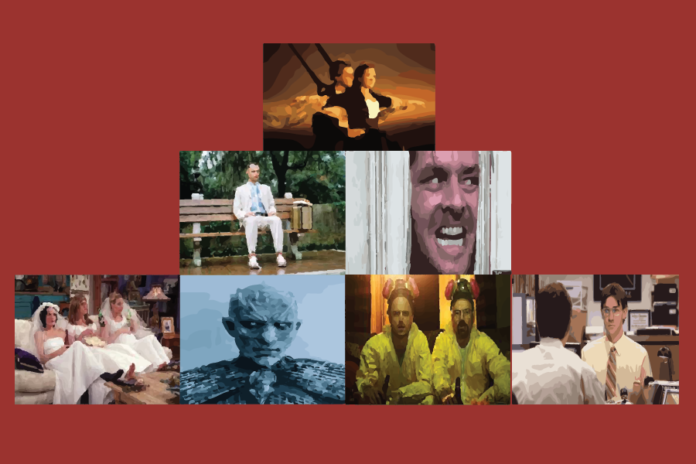How television is able to live up to the quality of cinema
No form of artistic expression is more cultivated than another. The intrinsic value that, for instance, classical literature can possess in comparison to free verse poetry is entirely subjective and thus cannot be measured by general perception.
When discussing movies and television — the “big screen” and the “small screen” respectively — it’s important to note that their titles are not indicative of their greatness, but rather of their closeness to audiences.
What appears to place film above television in the “hierarchy of art” is its forced concision and implied richness. Movies reduce a narrative to about two hours, cutting the “fat” of unnecessary scenes and dialogue. Because of this, television is often seen as expendable in comparison to cinema. A film’s ability to tell a story within a limited amount of time is both efficient and convenient for viewers. We dread seeing our favorite shows drag on for too long and may end up wondering if it would be better suited as a film.
It is the serialized story-telling format, however, that allows television to grow in complexity. And through patience, viewers can see these intricacies blossom. The anatomy of the televisual medium provides narrative methods that are simply unobtainable in film. This advantage builds an experience that is limitless, creating a unique bond with the audience. Although television may become prone to “rushed” or “sloppy” writing, it has the room to experiment with different arcs, which only makes the medium more compelling.
When we think of film, our minds often conjure up images of popcorn-filled aisles, the Oscars or celebrities standing on red carpets. No matter how many times we rewatch a film or familiarize ourselves with the cast, there always seems to be a distance between us and “the movie world.” Once we finish a film, we talk about it, read about it and think about it until there is nothing left to say. Then we pick up another movie, and the cycle starts again.
Television, on the other hand, creates a sense of intimacy in that it can easily be consumed in episodic moments throughout the day. Whether you’re watching your favorite episode of “The Office” while getting ready in the morning or scouring for a new show before finishing dinner, television remains a permanent guest in our homes.
And unlike film, television does not have to force out a revolutionary concept to garner attention. Shows such as “Friends” or “How I Met Your Mother,” which follow ordinary people in their ordinary lives, are successful for their relatability. It’s this mingling of our personal lives with the TV format that brings us comfort.
What immediately comes to mind in thinking of “cinematically powerful television” is Vince Gilligan’s “Breaking Bad.” The five-season show about a drug-dealing high school chemistry teacher only got better with time — allowing for complexities unachievable in film.
The polarizing “Fly” episode best exemplifies this. For 47 minutes, we see the protagonists, Walter and Jesse, attempt to remove a fly from their laboratory in order to prevent contamination. With no plot advancement or really any need, the episode was heavily criticized for being a “filler.”
But despite its mundane premise, the episode was significant in developing the relationship between the two characters. As viewers, we are able to slow down for a brief moment and reflect on the current state of Walter and Jesse’s relationship in all its toxicity. The brilliance of this episode is proof that television does not need to rely on bombastic action shots or big turning points to be great. What may seem like an empty episode about nothing can end up representing everything.
There is no time to waste in film. With only two- to three-hour durations, each scene and line needs to count in order to fully deliver the message. Television has the upper hand in that it can make the most of its extended frame. This longevity, however, should not be mistaken as an element of “low brow culture.” Instead, both mediums should be applauded in their ability to construct distinct narratives, regardless of their respective lengths.
Written by: Julietta Bisharyan — jsbisharyan@ucdavis.edu
Disclaimer: The views and opinions expressed by individual columnists belong to the columnists alone and do not necessarily indicate the views and opinions held by The California Aggie




